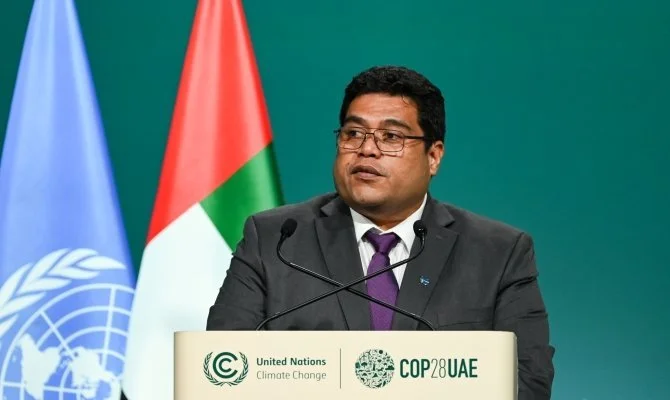PRESS RELEASE
11 December 2023
Amid battles to phase out fossil fuels at COP28, Nauru shows leadership by becoming 12th nation-state to formally call for a Fossil Fuel Non-Proliferation Treaty
December 11th, 2023 - Dubai – As negotiations come closer to an end at COP28 and delegates battle to agree on strong language for fossil fuel phase out in the cover text, we continue to witness the leadership of Pacific Island Nations who are joining the growing bloc of countries seeking a negotiating mandate for a Fossil Fuel Non-Proliferation Treaty. Following announcements from Palau, Colombia and Samoa at COP28, Nauru becomes the 12th nation to publicly call for a Treaty.
In his National Statement at the High Level Plenary of COP28, Mr Reagan Moses, Secretary for Climate Change and National Resilience of Nauru, said: “We are ready to do our part in making the Pacific a fossil fuel-free zone. In this regard, Nauru would like to use this opportunity to join others in calling for a treaty to phase out fossil fuel production.” Moses also highlighted the importance of financing a Just Transition in the most vulnerable countries: "As Ministers and negotiators review the draft decisions over the course of this week, there is an easy way to determine the value we place as a global community on addressing climate change. Just look at the finance. All of our vision - all of our political will - amounts to very little if those who hold the purse strings fail to deliver on finance."
Being so close to the equator, Nauru is subject to the impacts of rising sea levels as well as strong winds and sea swells, ocean acidification and increased risks of coral bleaching. "Our marine port is our island's lifeline, without which we would be almost entirely cut off from food, medicine, and almost all other necessities. This is not hypothetical, as even today, storms can cut us off from shipments many weeks at a time," said Secretary Moses in his speech.
The main climate extreme experienced by Nauru is drought, lasting as long as 36 months. Droughts usually occur during La Niña events when the surrounding sea temperature is lower, resulting in less cloud and rainfall. Prolonged droughts impact the underground fresh-water lens, resulting in water supply problems and severe stress on natural ecosystems.
Welcoming the announcement, Hon. Ralph Regenvanu, Vanuatu's Minister for Climate Change Adaptation, Energy, Environment, Meteorology, Geohazards and Disaster Management, said: "As the pioneers of this movement, Vanuatu is grateful to see so many fellow Pacific nations joining the group of countries championing the call for a Fossil Fuel Treaty and a Fossil Fuel Free Pacific. This announcement is a significant milestone in our collective journey towards a sustainable and resilient future. Together, we amplify our voices and show that our nation-states are not only on the front lines of climate impacts, we are also at the forefront of the climate fight, actively working to implement innovative solutions to address the harmful impacts that substances like oil, gas and coal pose on our communities. And we see the Treaty as one of these solutions."
Auimatagi Joe Moeono-Kolio Pacific Chief Advisor of the Fossil Fuel Non-Proliferation Treaty Initiative, said: "Pacific leadership in international climate forums has historically been critical. As the COP negotiations pick up pace, with the strongest lobbying from the fossil fuel industry ever seen, many Pacific countries are pushing for a strong outcome for the sake of our survival. On the sidelines, we are witnessing a growing movement that calls for a Fossil Fuel Treaty as an alternative, faster and more equitable solution to this crisis, and Nauru is the 4th country to do so here in Dubai. Other so-called 'leaders' must follow the Pacific's lead and stop using these forums as a performance stage while they continue to escalate the problem through the expansion of new fossil fuels and loophole language."
Nauru is joining a growing bloc of countries - Vanuatu, Tuvalu, Tonga, Fiji, Niue, the Solomon Islands, Antigua and Barbuda, Timor-Leste, Palau, Colombia and Samoa - who are spearheading a push to secure a mandate to negotiate a new international mechanism to manage a phase out of fossil fuels, and finance a just and equitable global transition away from oil, gas and coal.
Along with the group of 12 nations, the Fossil Fuel Non-Proliferation Treaty proposal is also supported by the World Health Organization, the European Parliament, 101 Nobel Laureates, 600+ parliamentarians in 83 countries, 2,100 civil society organisations, 3,000 scientists and academics and over 90 cities and subnational governments, including most recently the State of California, the fifth largest economy in the world, and 9 Peruvian Indigenous Nations.
Media ContactsNathalia Clark (in UAE)
nathalia@fossilfueltreaty.org
+55 61 99137 1229
About the Fossil Fuel Non-Proliferation Treaty InitiativeThe Fossil Fuel Non-Proliferation Treaty Initiative is spurring international cooperation to end new development of fossil fuels, phase out existing production within the agreed climate limit of 1.5°C and develop plans to support workers, communities and countries dependent on fossil fuels to create secure and healthy livelihoods. For more information on the Fossil Fuel Non-Proliferation Treaty Initiative and proposal, access here.
